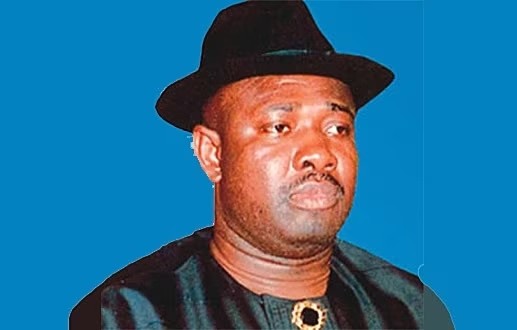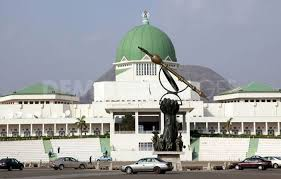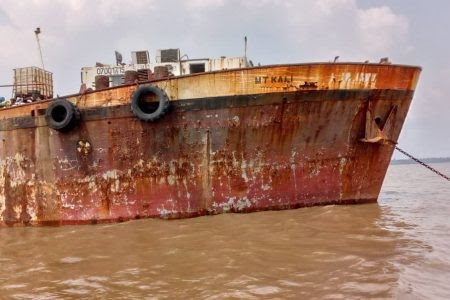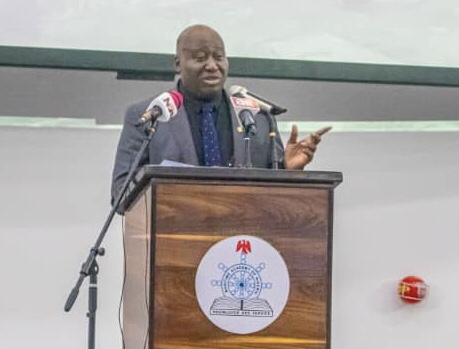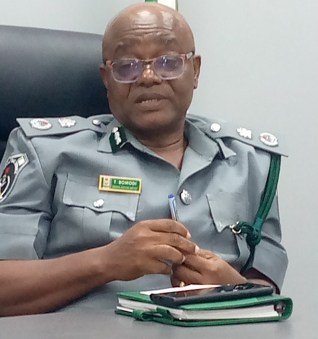News
‘We have record of fuel smuggling, it can’t be stopped’ – NNPC boss
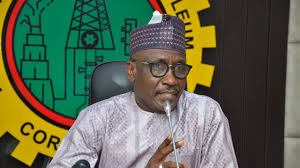
BY EGUONO ODJEGBA & FUNMI ALUKO
Barely a week after the Nigeria Customs Service (NCS) accused the Nigerian National Petroleum Corporation (NNPC) of failing to partner the Service to combat fuel smuggling across the borderlines, NNPC Group Managing Director, Engr. Melee Kyari has accepted responsibility, noting the Corporation have record of petroleum products smuggled outside the country.
Kyari’s far reaching and dramatic confession also provided graphic details of fuel racketeering within the sub region, up to Central Africa, even as his confession highlighted the damning verdict of subsidizing fuel consumption for the entire sub region and beyond. He also dismissed Customs proposal to set up fuel retail outlets along borderlines as essentially flawed.
The NCS Comptroller General, retired Col. Hameed Ali, had accused the NNPC of culpability in fuel smuggling at an interactive session with members of the House of Representatives Committee on Finance on the 2022-2024 Medium Term Expenditure Framework (MTEF) and the Fiscal Strategy Paper (FSP), noting that NNPC’s refusal to corporate with his organization in critical information sharing has made it impossible to end fuel smuggling.
Ali said the Nigerian borders are too vast and porous for customs to cover and to block fuel smuggling without critical synergy and intelligence sharing. The Customs boss equally lamented that his proposal for the NNPC to establish petroleum retail outlets in neighbouring countries to curtail smuggling of fuel was repeatedly neglected and ignored.
Confirming the damning report Wednesday at the House of Representatives Committee on Finance on the 2022-2024 Medium Term Expenditure Framework, Kyari advanced reasons it rejected the Customs proposition, even as he provided pictorial explanations of why it has remained top attractive, and why it may be impossible to stop fuel smuggling outside Nigeria.
Responding to query by lawmakers, the NNPC boss found solace in the reported directive by President Muhammadu Buhari to seek the involvement of the anti-graft agencies and department of state security which he believes have the wherewithal to wage the required war against fuel smuggling, so far aggressively driven by economic sabotage.
Asked by the House Committee Chairman, James Faleke to confirm his organization’s responsibility for importation of fuel, volume, distribution, monitoring and the volume of daily consumption, Kyari not only affirmed but availed the committee a seeming expanded report of the unfortunate regime of incongruous fuel racketeering, which he said begins its journey from the Petroleum Products Pricing Regulatory Agency (PPPRA).
“Yes. There is a single point of import, which is the NNPC. And the evacuation data is coming from the records that we receive from the PPPRA”, Kyari answered.
“I can confirm to you that anytime we supply less than 60 million litres per day, average, consecutively for two weeks, we will see shortages coming on the streets. Sometimes, it is not visible to the public but we see the constraint and we take necessary actions to close those gaps.”
Kyari also espoused a rare redeeming official candour when he opted to offer a more accurate report of the daily product consumption figures, rather than rely on the regime of strict officialdom, that often finds expression in twisted official posturing.
He said, “Much as I believe personally that our national consumption may not be 60 million litres per day, I am convinced that anytime you supply less than 60 million litres per day, you will have a challenge here. A number of things are happening.
“Without any contradiction, the oil that we import into this country gets everywhere. It is found in many West African countries. It goes as far as Sudan; we have records to show this. It is found in many countries that are proximate to us but as far as the Central African Republic.
“This is very true. In addition to this, once you have a situation of price arbitrage, everything can happen. And I can confirm that it is very difficult to contain it.”
He continues: “Mr. President has personally directed me to take every step possible to make sure that we contain the issues around cross-border smuggling; issues around early pilferages in the depots and any involvement of anyone to get this resolved.
“We have taken several steps. We have involved the EFCC, the Department of State Services; we are collaborating and engaging with the Customs Service; we are engaging and collaborating with the Department of Petroleum Resources; and everybody that has a stake in this.”
Corroborating the Customs boss earlier submission, Kyari said, “With the best of action and the best of intention, you will still have a challenge containing cross-border smuggling. As you are aware, we have up to 3000 kilometres of land borders.
“In many of the locations, they practically don’t exist; you don’t need to ply the road to cross into another country. That is the reality. I need your help to contain this but the reality still remains that we are supplying everyone else.”
On the suggestion by the NCS for NNPC to commence retail marketing along the borderlines to reduce fuel smuggling, Kyari expressed certain degree of skepticism, noting that the suggestion look attractive on the face of paper but fundamentally incompetent. He assured that with the recent passage of the Petroleum Industry Act (PIA), cross border smuggling of fuel will experience significant containment based purely on marketing dynamics.
“I have also seen the recommendation by the CG of Customs, that we should go and establish fuel stations across our borders to curtail smuggling. The people who are smuggling are not looking for officially priced petroleum products, unfortunately.
“So, when you go ahead, across the countries and establish fuel stations…except you are going to see it at N162 (per litre), then everybody will come to you. As long as you are going to sell at the market rate…it is the same reason that is bringing them here to smuggle.
“At the risk of being repetitive, the people who take products across the border will not sell at the official price because when you buy here at N162 and the official price, say in Niger, is N400 per litre, that is what you will buy at the fuel station. So, when you establish a fuel station, you must sell at N400.
“We have thought of this; as a matter of fact, we are already engaging the national oil company of Niger in particular to establish NNPC Retail fuel stations in the country, but we are also conscious of the very fact that it can be a bad business because you are going to compete with the people who are coming to collect (and smuggle).”


